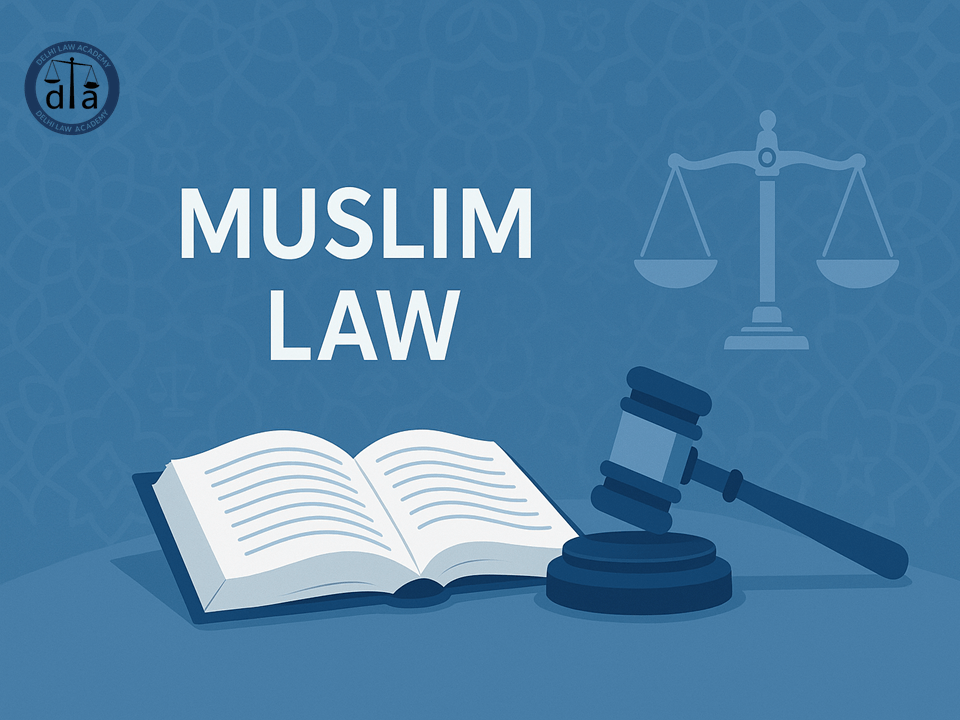
⚖️ Preparation for RJS, DJS, PCS (J) and Other Judicial Service Exams
📘 TALAQ-E-BIDDAT
The practice of ‘talaq-e-biddat’ – triple talaq is set aside.
SHAYARA BANO v. UNION OF INDIA [2017 SC]
This form of Talaq must, therefore, be held to be violative of the fundamental right contained under Article 14 of the Constitution.”
Muslim Law is an important component of most Judicial Service exams in the country. Its thorough knowledge is a must for all aspirants of RJS, DJS, PCS (J) and other Judicial Service exams. To help such aspirants, DELHI LAW ACADEMY JAIPUR has launched a series of study material modules on all important aspects of this important part of their syllabus:
📜 In Re: Muslim Women’s Quest for Equality v. Jamiat Ulma-I-Hind
Petitioner-Shayara Bano has approached this Court for assailing the divorce pronounced by her husband – Rizwan Ahmad on 10.10.2015, wherein he affirmed “…in the presence of witnesses saying that I gave ‘talak, talak, talak’, hence like this I divorce from you from my wife. From this date there is no relation of husband and wife. From today I am ‘haraam’, and I have become ‘naamharram’.
The petitioner has sought a declaration that the ‘talaq-e-biddat’ pronounced by her husband on 10.10.2015 be declared as void ab initio.
We have arrived at the conclusion that ‘talaq-e-biddat’ is a matter of ‘personal law’ of Sunni Muslims belonging to the Hanafi School. It constitutes a matter of their faith. It has been practiced by them for at least 1400 years.
We have examined whether the practice satisfies the constraints provided for under Article 25 of the Constitution and have arrived at the conclusion that it does not breach any of them. We have also come to the conclusion that the practice being a component of ‘personal law’ has the protection of Article 25.
We have arrived at the conclusion that the legal challenge raised at the behest of the petitioners must fail on the judicial front. Be that as it may, the question still remains whether this is a fit case for us to exercise our jurisdiction under Article 142, “…for doing complete justice …” in the matter. The reason for us to probe the possibility of exercising our jurisdiction under Article 142 arises only for one simple reason that besides being arbitrary the practice of ‘talaq-e-biddat’ is gender discriminatory.
The practice of ‘talaq-e-biddat’ has been done away with by way of legislation in a large number of egalitarian States with sizeable Muslim population and even by theocratic Islamic States.
We are satisfied that this is a case which presents a situation where this Court should exercise its discretion to issue appropriate directions under Article 142. We therefore hereby direct the Union of India to consider appropriate legislation particularly with reference to ‘talaq-e-biddat’.
Till such time as legislation in the matter is considered, we are satisfied in injuncting Muslim husbands from pronouncing ‘talaq-e-biddat’ as a means for severing their matrimonial relationship. The instant injunction shall in the first instance be operative for a period of six months. If the legislative process commences before the expiry of the period of six months and a positive decision emerges towards redefining ‘talaq-e-biddat’ (three pronouncements of ‘talaq’ at one and the same time) – as one, or alternatively, if it is decided that the practice of ‘talaq-e-biddat’ be done away with altogether, the injunction would continue, till legislation is finally enacted. Failing which, the injunction shall cease to operate.
(Jagdish Singh Khehar), (S. Abdul Nazeer)
Therefore, the simple question that needs to be answered in this case is only whether triple talaq has any legal sanctity. That is no more res integra. This Court in Shamim Ara v. State of UP has held, though not in so many words, that triple talaq lacks legal sanctity. Therefore, in terms of Article 141, Shamim Ara is the law that is applicable in India.
The Muslim Personal Law (Shariat) Application Act, 1937 was enacted to put an end to the unholy, oppressive and discriminatory customs and usages in the Muslim community. Shariat, having been declared to be Muslim Personal Law by the 1937 Act, we have to necessarily see what Shariat is.
I find it extremely difficult to agree with the learned Chief Justice that the practice of triple talaq has to be considered integral to the religious denomination in question and that the same is part of their personal law.
On the statement that triple talaq is an integral part of the religious practice, I respectfully disagree. Merely because a practice has continued for long, that by itself cannot make it valid if it has been expressly declared to be impermissible. The whole purpose of the 1937 Act was to declare Shariat as the rule of decision and to discontinue anti-Shariat practices with respect to subjects enumerated in Section 2 which include talaq. Therefore, in any case, after the introduction of the 1937 Act, no practice against the tenets of Quran is permissible. Hence, there cannot be any Constitutional protection to such a practice and thus, my disagreement with the learned Chief Justice for the constitutional protection given to triple talaq. I also have serious doubts as to whether, even under Article 142, the exercise of a Fundamental Right can be injuncted.
Fortunately, this Court has done its part in Shamim Ara. I expressly endorse and re-iterate the law declared in Shamim Ara. What is held to be bad in the Holy Quran cannot be good in Shariat and, in that sense, what is bad in theology is bad in law as well.
(Kurian Joseph)
Given the fact that Triple Talaq is instant and irrevocable, it is obvious that any attempt at reconciliation between the husband and wife by two arbiters from their families, which is essential to save the marital tie, cannot ever take place. Also, as understood by the Privy Council in Rashid Ahmad, such Triple Talaq is valid even if it is not for any reasonable cause, which view of the law no longer holds good after Shamim Ara. This being the case, it is clear that this form of Talaq is manifestly arbitrary in the sense that the marital tie can be broken capriciously and whimsically by a Muslim man without any attempt at reconciliation so as to save it. This form of Talaq must, therefore, be held to be violative of the fundamental right contained under Article 14 of the Constitution.
In our opinion, therefore, the 1937 Act, insofar as it seeks to recognize and enforce Triple Talaq, is within the meaning of the expression “laws in force” in Article 13(1) and must be struck down as being void to the extent that it recognizes and enforces Triple Talaq. Since we have declared Section 2 of the 1937 Act to be void to the extent indicated above on the narrower ground of it being manifestly arbitrary, we do not find the need to go into the ground of discrimination in these cases.
(Rohinton Fali Nariman), (Uday Umesh Lalit)
📑 Order of the Court
- In view of the different opinions recorded, by a majority of 3:2 the practice of ‘talaq-e-biddat’ – triple talaq is set aside.
August 22, 2017.
📚 Continue Your Muslim Law Preparation
Don’t stop here! Strengthen your knowledge of Muslim Law with our blogs:
📘 Free Study Material for Judiciary Aspirants!
Download our FREE study material prepared by Delhi Law Academy’s expert faculty.
📘 Frequently Asked Questions on Muslim Women (Protection of Rights on Divorce) Act, 1986
Contact us
📍 Delhi Law Academy – Jaipur Branch
6C, Tower 2, Coaching Hub, Pratap Nagar, Jaipur – 302033
📞 Phone:
+91 9911916552
+91 8447285606
✉️ Email:
contactus@delhilawacademy.com

